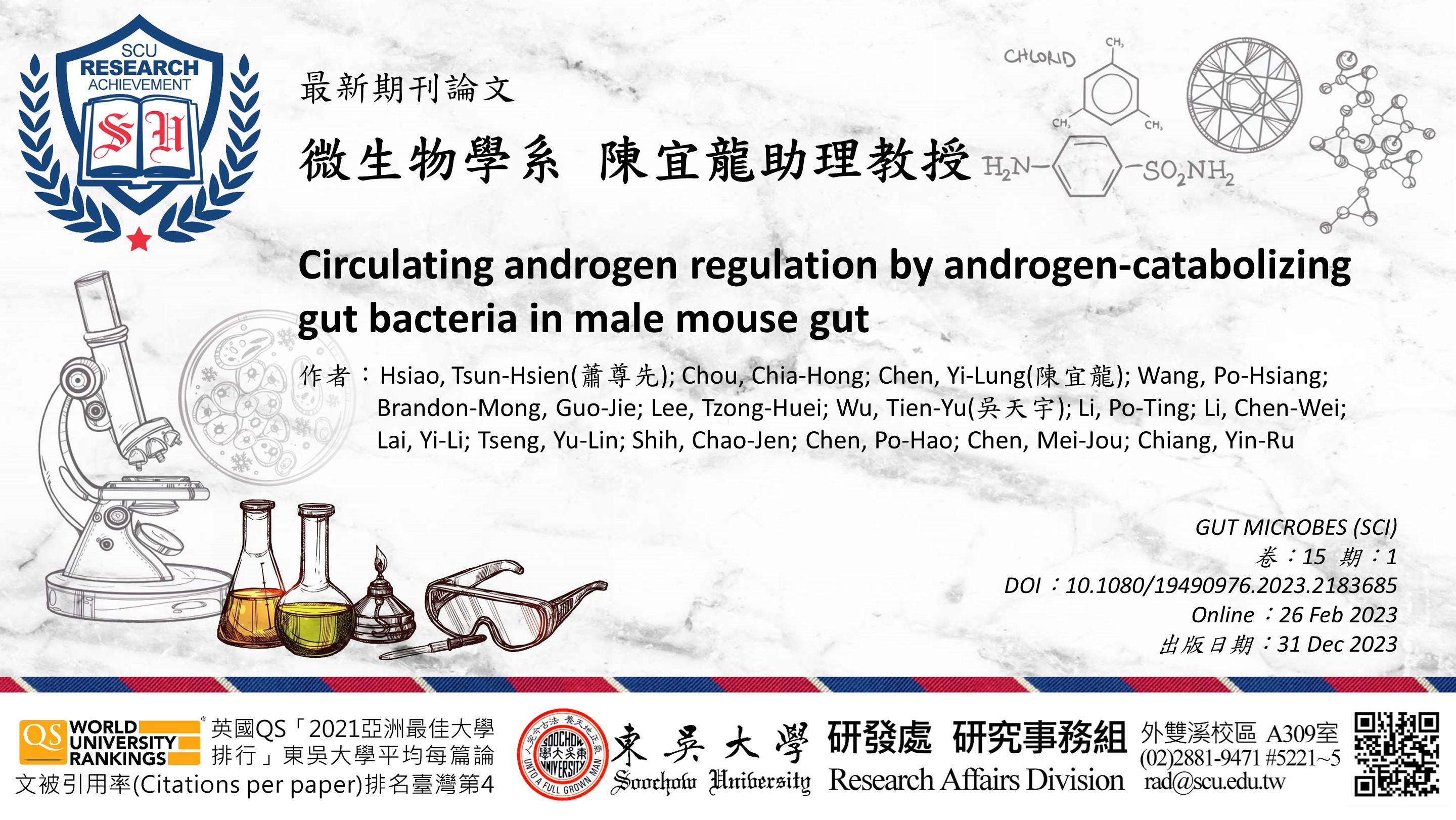微生物學系陳宜龍助理教授發表最新期刊論文
Circulating androgen regulation by androgen-catabolizing gut bacteria in male mouse gut
作者:Hsiao, Tsun-Hsien(蕭尊先); Chou, Chia-Hong; Chen, Yi-Lung(陳宜龍); Wang, Po-Hsiang; Brandon-Mong, Guo-Jie; Lee, Tzong-Huei; Wu, Tien-Yu(吳天宇); Li, Po-Ting; Li, Chen-Wei; Lai, Yi-Li; Tseng, Yu-Lin; Shih, Chao-Jen; Chen, Po-Hao; Chen, Mei-Jou; Chiang, Yin-Ru
GUT MICROBES (SCI)
卷:15 期:1
DOI:10.1080/19490976.2023.2183685
Online:26 Feb 2023
出版日期:31 Dec 2023
摘要:
Abnormally high circulating androgen levels have been considered a causative factor for benign prostatic hypertrophy and prostate cancer in men. Recent animal studies on gut microbiome suggested that gut bacteria are involved in sex steroid metabolism; however, the underlying mechanisms and bacterial taxa remain elusive. Denitrifying betaproteobacteria Thauera spp. are metabolically versatile and often distributed in the animal gut. Thauera sp. strain GDN1 is an unusual betaproteobacterium capable of catabolizing androgen under both aerobic and anaerobic conditions. We administered C57BL/6 mice (aged 7 weeks) with strain GDN1 through oral gavage. The strain GDN1 administration caused a minor increase in the relative abundance of Thauera (<= 0.1%); however, it has profound effects on the host physiology and gut bacterial community. The results of our ELISA assay and metabolite profile analysis indicated an approximately 50% reduction in serum androgen levels in the strain GDN1-administered male mice. Moreover, androgenic ring-cleaved metabolites were detected in the fecal extracts of the strain GDN1-administered mice. Furthermore, our RT - qPCR results revealed the expression of the androgen catabolism genes in the gut of the strain GDN1-administered mice. We found that the administered strain GDN1 regulated mouse serum androgen levels, possibly because it blocked androgen recycling through enterohepatic circulation. This study discovered that sex steroids serve as a carbon source of gut bacteria; moreover, host circulating androgen levels may be regulated by androgen-catabolizing gut bacteria. Our data thus indicate the possible applicability of androgen-catabolic gut bacteria as potent probiotics in alternative therapy of hyperandrogenism.
中文介紹:
除了微生物學系的陳宜龍助理教授為本篇論文的共同作者外,微生物系兩位系友也參與其中,他們為蕭尊先博士(第一作者),以及吳天宇先生。
較高雄激素濃度可能導致男性前列腺肥大和攝護腺癌。最新研究發現,腸道微生物與性激素代謝有關,但具體機制和細菌種類仍待釐清。其中一類稱為Thauera的細菌時常存活於動物腸道,並具有多樣的代謝能力。本研究對小鼠餵食一種特定的Thauera (標示為GDN1),結果顯示餵給GDN1後,雄鼠血液中雄激素濃度顯者降低;此外,在該小鼠糞便樣本中也能檢測到雄激素降解後的代謝物。GDN1很可能通過阻斷雄激素腸肝循環來調節雄鼠體內雄激素水平。腸道細菌利用性激素作為能量來源的新發現,暗示腸道細菌可能調節宿主體內雄激素水平。因此,具有雄激素分解能力的腸道細菌或許可作為治療高雄激素症的潛在方法。目前我們也朝開發相關人類益生菌持續努力。
研究事務組提醒:教師如有最新發表於AHCI、SSCI、SCI、EI、TSSCI、THCI、「東吳大學外語學門獎勵名單」之期刊論文,歡迎將相關資訊e-mail至rad@scu.edu.tw,研究發展處將會公告於校園頭條,以廣交流。
【文圖/研究事務組謝明秀專員】
